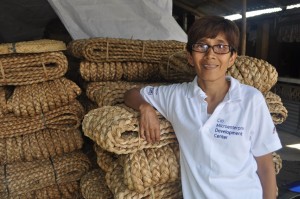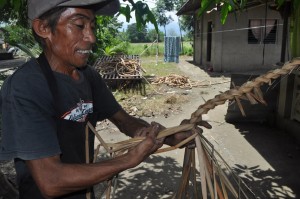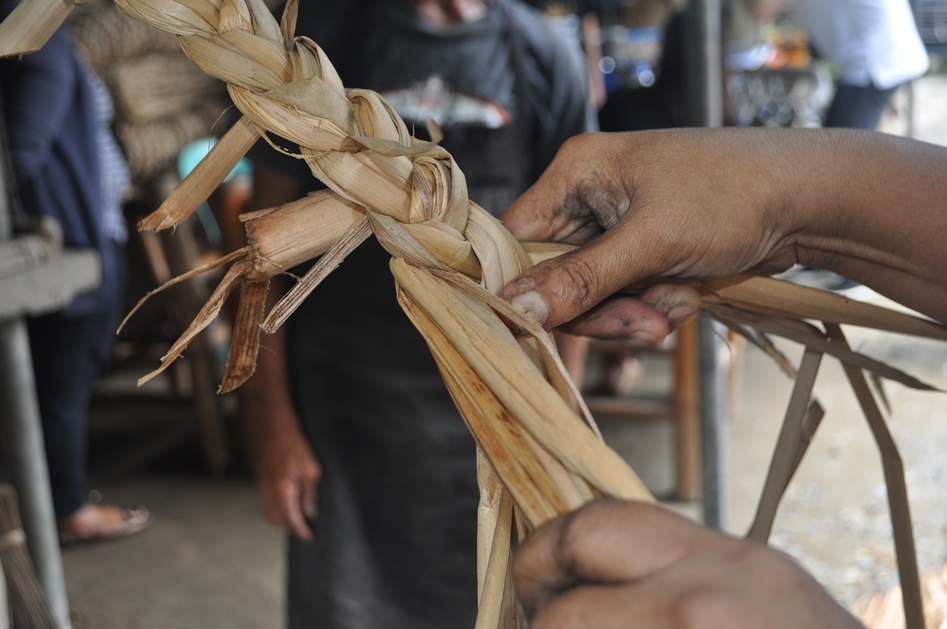MANY SMALL Filipino enterprises are born out of a livelihood skill, a bright idea, or a strong drive to sell products to address the needs of the market. Fortunately for some of these small enterprises, being creative and innovative sets them apart from the rest and proves to be critical in their success.
A concrete example of an innovative entrepreneur is Beatriz Sibayan, a 52-year-old handicraft manufacturer from Pangasinan, a northern Philippine province known for its vast array of indigenous raw materials available for handicraft-making. In her native town of Mangatarem, Nanay Beatriz has focused on resources such as abaca and bangkwang, a type of sea grass that locally grows in the area.
Recycling and innovation
Bangkwang, according to locals, has practically no use and grows near fish ponds and farmlands like wild grass. Nanay Beatriz capitalizes on the opportunity to turn the sea grass into something useful like a bangkwang rope for handicraft-manufacturing or a native bag that can be readily sold to the market.

Nanay Beatriz Sibayan, a bangkwang handicraft manufacturer from Pangasinan, was one of the semifinalists in the 2015 Citi Microentrepreneurship Awards
“Bangkwang grows extensively here in our town. The raw materials are easily available. It’s like we are recycling trash into useful materials,” Nanay Beatriz said in Filipino.
She started as a home-based abaca twiner, supplying for other larger handicraft businesses. But this came as a challenge as she noticed how workers and suppliers are being treated differently in the workplace.
“I wanted to try running the enterprise on my own. As a worker, I wanted to be treated fairly so I also wanted to do the same for my workers. Fortunately, some of my friends from my previous workplace eventually worked for me,” she said.
This major shift in 2007 gave her the opportunity to showcase her ingenuity, by creating weaved items from the twines supplied by home-based mothers like her. Her space also served as a hub for handicraft raw materials needed by larger businesses.
Her ingenuity did not go unnoticed as she made it as a Finalist in the recent 2015 Citi Microentrepreneurship Awards.
“I thank TSPI for nominating me in this competition. TSPI has been a big help to me. Aside from giving me the capital to further grow my business, I also feel I have grown spiritually through TSPI’s Usapang Paglago (TSPI Discipleship Seminars),” she said.

EMPLOYEES ARE FAMILY. Nanay Beatriz treats her employees fairly. One of her employees is a male bangkwang weaver from her community.
Proof of her spiritual resilience is her ability to remain prayerful despite the challenges of the business. During the first few years of the business, she encountered bouncing cheques, unsuccessful business deals, and even delivery accidents, which greatly impaired her revolving capital.
“I felt like giving up. There were times that we would not be able to collect from delinquent buyers. I had used up all my capital and it was a very difficult time. I knew that the Lord was putting my faith to the test. I knew He would not give me a challenge that I cannot overcome,” she recalled.
Nanay Beatriz had to put her innovative skills to the test so she could keep her business running. When her capital funds were dwindling, she sold her cow for Php 15,000 so she can have additional capital. She also made use of her TSPI loan wisely. She was able to slowly regain the funds needed to sustain the handicraft business.
Nanay Beatriz’ innovative spirit and keen eye for opportunity gave life to her small enterprise. Her handicraft business is home and refuge for around 65 workers, which she considers as family, and not employees.
Employees are family
This innovative skill is not only her weapon for the challenges brought by the enterprise. Innovation is also Nanay Beatriz’ weapon in life.
“When we were young, we didn’t have enough money to go to college. I had 10 siblings. Sometimes, we didn’t even have money for food. So I would make use of the little resources from my father’s small farmland to boil some banana or feed my siblings with corn,” she remembered with a tear.
She knows the importance of taking care of ones’ family so she makes it a point to pay her workers on time. She would go to great lengths to prioritize her workers’ wages because this is where they get the money for their basic needs. She shared that she and her husband, Camilo, know the difficulty of not having money to buy basic needs for their three girls.
“I know the feeling of having nothing. We would use rice flour to make milk. We needed to innovate,” she said.
When asked about the greatest blessing she received, she was quick to mention her family and her employees.
“My business means nothing without my employees. I consider my employees as God’s blessing to me. I treat them like family.”
Nanay Beatriz may be a successful microentrepreneur but she is quick to acknowledge God for her good fortune. She is blessed to be entrusted with the skills and weapons to innovate and create something wonderful for His greater glory.
Text and photos by Ms. Joanne G. Fajardo of Enterprise Development Services. With reports from Mr. Benjamin Freeman, Opportunity International Australia’s International Communications Officer.

